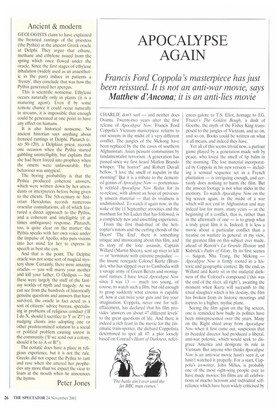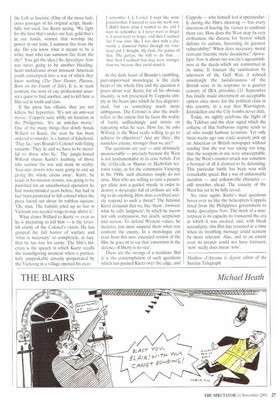APOCALYPSE AGAIN
Francis Ford Coppola 's masterpiece has just been reissued. It is not an anti-war movie, says
Matthew d'Ancona; it is an anti-lies movie CHARLIE don't surf — and neither does Osama. Twenty-two years after the first release of Apocalypse Now, Francis Ford Coppola's Vietnam masterpiece returns to our screens in the midst of a very different conflict. The jungles of the Mekong have been replaced by the the caves of southern Afghanistan; Asian peasant communism by fundamentalist terrorism. A generation has passed since we first heard Marlon Brando whisper, 'The horror!' and Robert Duvall bellow, 'I love the smell of napalm in the morning!' But it is a tribute to the demented genius of Apocalypse Now — portentously retitled Apocalypse Now Redux for its re-release, with almost an hour of previously unseen material — that its vividness is undiminished. To watch it again now, in the wake of the 11 September atrocities and the manhunt for bin Laden that has followed, is a completely new and unsettling experience.
From the first thud-thud of the helicopter's rotors and the curling chords of the Doors' The End', there is something unique and intoxicating about this film, and its story of the lone assassin, Captain Willard (Martin Sheen), sent up river to kill — or 'terminate with extreme prejudice' — the insane renegade Colonel Kurtz (Brando), who has slipped over to Cambodia with a savage army of Green Berets and montagnard natives. I have loved Apocalypse Now since I was 13 — much too young, of course, to watch such a film, but old enough to grasp suddenly what cinema is capable of, how it can twist your guts and fire your imagination. Coppola, never one for selfeffacement, has declared that his film provides 'answers on about 47 different levels' to the great questions of life. And there is indeed a rich feast in the movie for the cinematic train-spotter, the diehard Coppolista determined to spot all 47: a plot loosely based on Conrad's Heart of Darkness, refer
ences galore to T.S. Eliot, homage to J.G. Frazer's The Golden Bough, a dash of Goethe, the myth of the Fisher King transposed to the jungles of Vietnam, and so on, and so on. Books could be written on what it all means, and indeed they have.
Yet all of this seems trivial now, a parlour game played by a generation made soft by peace, who loved the smell of lip balm in the morning. The lost material incorporated by Coppola in his new version — including a sensual sequence set in a French plantation — is intriguing enough, and certainly does nothing to harm the film. But the unseen footage is not what sticks in the memory. To watch Apocalypse Now on the big screen again, in the midst of a war which will not end in Afghanistan and may indeed last for many, many years — at the beginning of a conflict, that is, rather than in the aftermath of one — is to grasp what a truly great film it is. Indeed, it is less a movie about a particular conflict than a treatise on warfare in general: in my view, the greatest film on this subject ever made, ahead of Renoir's La Grande Illusion and Kubrick's Paths of Glory. In its first scenes — Saigon, Nha Trang, the Mekong — Apocalypse Now is firmly rooted in a historic and geographic context. By the end. as Willard and Kurtz sit in the malarial darkness of the Colonel's compound (this was the end of the river, all right'), awaiting the moment when Kurtz will succumb to the ritual slaughter which is his destiny, the film has broken from its historic moorings and aspires to a higher, mythic plane.
Seeing the film again on the big screen, one is reminded how badly its politics have been misrepresented over the years. Many on the Right shied away from Apocalypse Now when it first came out, suspicious that its bearded director had produced a liberal, anti-war polemic, which would seek to disgrace America and denigrate its role in Vietnam. But anyone who thinks Apocalypse Now is an anti-war movie hasn't seen it, or hasn't watched it properly. For a start, Coppola's co-writer, John Milius. is probably one of the most right-wing people ever to have made movies: his films are all celebrations of macho heroism and individual selfreliance which have been widely criticised by the Left as fascistic. (One of the more ludicrous passages of his original script, thankfully not used, has Kurtz saying, 'We fight for the land that's under our feet, gold that's in our hands, women that worship the power in our loins. I summon fire from the sky. Do you know what it means to be a white man who can summon fire from the sky?' You get the idea.) So Apocalypse Now was never going to be another bleedingheart melodrama about innocent American youth conscripted into a war of which they knew nothing (The Deer Hunter, Platoon, Born on the Fourth of July). It is, in stark contrast, the story of one professional assassin's quest to find another, and to kill him: a film red in tooth and claw.
If the piece has villains, they are not killers, but hypocrites. 'It's not an anti-war movie,' Coppola said, while on location in the Philippines. 'It's an anti-lies movie.' One of the many things that slowly bonds Willard to Kurtz. the man he has been ordered to murder. is a hatred of falsehood. 'They lie,' says Brando's Colonel with lilting sarcasm. 'They lie and we have to be merciful to those who lie.' The jungle-honed Willard shares Kurtz's loathing of those who sanitise the war and mask its reality: lour-star clowns who were going to end up giving the whole circus away'. Kurtz, he reads in his mission dossier, was going to be punished for an unauthorised operation he had masterminded years before, but had in fact been promoted to full colonel when the press found out about its ruthless success: 'Oh, man. The bullshit piled up so fast in Vietnam you needed wings to stay above it.'
What draws Willard to Kurtz — even as he is preparing to kill him — is the feverish clarity of the Colonel's vision. He has grasped the full horror of warfare and 'what is necessary' so completely, in fact, that he has lost his sanity. The film's fulcrum is the speech in which Kurtz recalls the transfiguring moment when a particularly unspeakable atrocity perpetrated by the Vietcong in a village opened his eyes:
I remember 1. I. I cried. I wept like some grandmother. I wanted to tear my teeth out. I didn't know what I wanted to do, and I want to remember it. I never want to forget it. 1 never want to forget, and then I realised like I was shot. like I was shot with a diamond, a diamond bullet through my forehead and I thought, My God, the genius of that. The genius, the will to do that.... And then I realised that they were stronger than we, because they could stand it.
At the dark heart of Brando's rambling, part-improvised monologue is the dark heart of the whole film and the question it poses about war. Kurtz, for all his obvious insanity, is not presented by Coppola simply as the beast into which he has degenerated. but as something much more ambiguous. The Colonel is also the truthteller, to the extent that he faces the reality of battle unflinchingly and insists on repeating what he sees. How far, he asks Willard, is the West really willing to go to achieve its objectives? And are 'they', the nameless enemy, stronger than we are?
The questions are real — and ultimately unanswerable — precisely because the West is not fundamentalist in its core beliefs. For the al-Qa'eda or Hamas or Hezbollah terrorist today, as for the communist Vietcong in the 1960s, such dilemmas simply do not arise. Men who arc willing to turn a passenger plane into a guided missile in order to destroy a skyscraper full of civilians are willing to do anything. How does a civilised society respond to such a threat? The fictional Kurtz demands that we, like 'them', forswear what he calls 'judgment', by which he means not only compassion, but doubt. scepticism and reason. To defend Western values, he declares, you must suspend them when you confront the enemy. In a monologue cut even from this new, extended version of the film, he goes on to say that 'extremism in the defence of liberty is no vice'.
These are the ravings of a madman. But it is the contemplation of such questions which has pushed Kurtz over the edge, and
Coppola — who himself lost it spectacularly during the film's shooting — has every intention of forcing the viewer to confront them too. How does the West stop its very civilisation, the distaste for 'horror' which defines its culture, becoming its greatest vulnerability? When does necessary moral restraint become mere decadence? Apocalypse Now is about our society's squeamishness at the deeds which are committed in its name. It foresaw the sanitisation by television of the Gulf War; it echoed unwittingly the fastidiousness of the British state in its response to a quarter century of IRA atrocities (11 September has finally made internment an acceptable option once more for the political class in this country, in a way that Warrington. Enniskillen and the City bombs never did).
Today, we rightly celebrate the flight of the Taleban and the clear signal which the collapse of that barbarous regime sends to all who would harbour terrorists. Yet only three weeks ago one could scarcely pick up an American or British newspaper without reading that the war was taking too long, that the weapons in use were unacceptable. that the West's counter-attack was somehow a betrayal of all it claimed to be defending. This particular battle has been won with remarkable speed. But a war of unknowable duration — and unknowable character — still stretches ahead. The tenacity of the West has yet to be fully tested.
So, once again, Kurtz's mad questions hover over us like the helicopters Coppola hired from the Philippines government to make Apocalypse Now. The mark of a masterpiece is its capacity to transcend the era in which it was created, and, with bleak serendipity, this film has returned at a time when its troubling message could scarcely be more relevant. Alas, and to an extent even its creator could not have foreseen, 'now' really does mean 'now'.
Matthew d'Ancona is deputy editor of the Sunday Telegraph



















































































 Previous page
Previous page